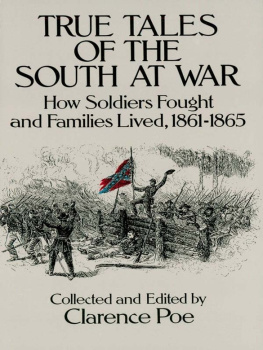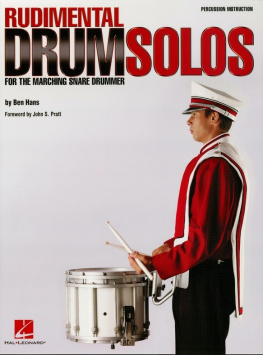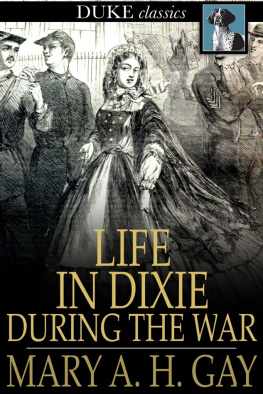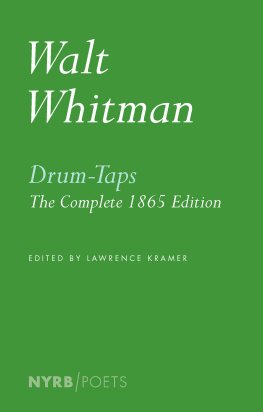Preface
Table of Contents
A chance meeting with a comrade who was instrumental in saving from capture a piece of artillery at the second battle of Bull Run suggested one of the several sketches grouped together in this volume.
Memory awakened furnished material for those that followed, each article recalling faces, forms, scenes and incidents from out of the misty past.
Awake but one, and lo!
What myriads rise!
The writer has enjoyed his reminiscing. It has been a labor of love, so to speak, enabling him in a measure to live the old days over again.
The articles have been written at odd times after business hours, and should not be scrutenized too closely from a literary standpoint.
The writing of the memories of a drummer boy has been a source of pleasure and rest to the writer, who sincerely hopes that the reading of them may not weary those who, in their hours of rest, may scan these pages.
Delavan S. Miller.
CHAPTER I.
Table of Contents
OFF FOR THE WAR.
When the news was flashed across the country that Fort Sumter had been fired upon the writer was a 12-year-old boy residing in West Carthage. The events of those days stand forth in his memory like the hillcrests of a landscape.
The shot electrified the north, and the martial current that went from man to man was imparted to the boys. Favorite sports and pastimes lost their zest. Juvenile military companies paraded the streets every evening and mimic battles were fought every Saturday afternoon.
The flag lowered over Fort Sumter was unfurled everywhere. Flags cost money in those days, too, but they were flung to the breeze from the tops of churches, school houses, business places and the homes of the rich and the poor. I used to go up on the roof of my home nearly every day to count the new banners.
The rendezvous for the boys of our neighborhood was Jim Coreys blacksmith shop. Jim was a typical village blacksmith with a hearty greeting for every one, old and young. The boys could always count on Jims sympathy if they had a stone bruise, got a licking at home or lacked ten cents of the price of a circus ticket.
Coreys shop was also a favorite meeting place for the men. Here they would assemble after supper and discuss the all-absorbing topic, the war.
One of the most regular in attendance was Wash Hopkins, as he was familiarly called. A particular nail keg with a piece of buffalo skin thrown over the end was the seat always reserved for him. He usually allowed the others to do the talking, but when he had anything to say it was right to the point.
Almost everybody was of the opinion that the South was putting up a big game of bluff and that the affair would blow over quickly.
On one occasion those gathered in the blacksmith shop had been discussing the situation and were pretty unanimous that the rebellion would be crushed out in sixty days. Wash roused himself and quietly remarked: Guess youd better make it ninety, boys.
At another time a young man was telling those assembled that he had enlisted in a company of sharpshooters; that they were going to pick off the rebel officers and artillerymen as fast as they showed themselves, which would demoralize the troops and send them flying from the field. Thats all right, says Wash, but what do you suppose the other fellows are going to do while youre shooting at them? Perhaps they may have sharpshooters, too.
How little I thought in those early days of the war that Corey and I would be soldiering in the same company and regiment a few months later.
I recall the thrilling war meetings that were held in the churches and school houses. There was scarcely a place in the county where there was a store and postoffice that did not have its war meeting each week. It is worthy of mention that the most enthusiastic speakers on such occasions were eager to enlistothers. There comes to my mind the names of several who were always urging others to enlist, but who stayed at home and coined money while others fought, and after the war labored to have refunded to them by the taxpayers the money that they had expended for a substitute.
Carthage sent volunteers promptly in response to Lincolns call, and a few days after the fall of Sumter about two dozen young men left to join the old 35th New York infantry.
There was no railroad to Carthage in those days, and they rode away in wagons drawn by four horses. The scene comes before me as I write. The sad partings, the waving banners, the cheers of the multitude who had gathered to see them off to the war. Those were anxious, exciting days that the present generation know but little about.
Among that party of first volunteers was a favorite cousin of the writer who was scarcely seventeen years old. The one thing above all others that I wished as I saw him ride away was that I was old enough to go, too.
Patriotism ran high in Carthage, and the town sent more than its share of volunteers in the early days of the war before there were any big bounties and when the pay was $11 per month.
One bright morning in the fall of 1861 a motherless lad of less than thirteen saw his father go away with a company of men that had been recruited for the Morgan Flying Artillery, then being organized at Staten Island, in New York harbor. He wanted to go with his father, but the suggestion was not listened to.
After the regiment was sent to Virginia Capt. Smith of the Carthage company returned home after more men. He brought a letter to the little lad from his father and, patting the boy on his head, asked him in a joking way how he would like to be a soldier. This gave the boy an opportunity that he was wanting, and he pleaded with the officer to take him back with him. The mother was dead, the home was broken up; the little fellow argued that he would be better off with his father.
The tender hearted captain sympathized with the boy, but said he did not know what he could do with such a little fellow. The boy would not be put off, however. He had inherited persistency from his Scottish ancestors, and after much importuning the captain said that he did not know how it could be managed, but he would try to take the boy back with him.
In March, 1862, when two months past thirteen years old, the one of whom I write started for the war with a squad of recruits in charge of Sergt. Wesley Powell. Strange to relate, this same Powell, two years and a half later, had charge of a detachment of soldiers carrying rations to their comrades on the firing line in front of Petersburg, when a shell burst so close to them that several were stunned, although not seriously injured, and among them was the boy who went to the war with the sergeant so long before.










